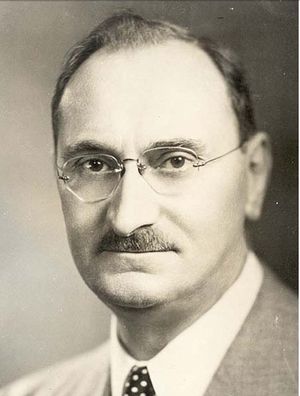Charles Powel: Difference between revisions
m (Text replace - "[[Category:Power, energy & industry application|" to "[[Category:Power, energy & industry applications|") |
m (Text replace - "[[Category:Power, energy & industry applications" to "[[Category:Energy") |
||
| Line 11: | Line 11: | ||
Powel was also active in the [[AIEE History 1884-1963|American Institute of Electrical Engineers (AIEE)]]. He served on numerous AIEE committees, including the Lamme Medal, 1939-1942; Standards, 1939-1944; Education, 1942-1944; and [[IEEE Edison Medal|Edison Medal]], 1943-1948. He was also a member of the AIEE board of directors from 1936 until 1940. He became an [[IEEE Fellow Grade History|AIEE Fellow]] in 1941 and was the [[Presidents of the American Institute of Electrical Engineers (AIEE)|organization’s President]] from 1944-45. Powel authored The Principles of Electrical Utility Engineering in 1955, as well as numerous articles. His interest in fostering the careers of younger engineers was evident in the subject matter of some of his writings, as, for example, Mathematical Training for Young Engineers, The Engineer and His Future, and The Romance of Engineering. [[Eta Kappa Nu]] named him an Eminent Member in 1953. Powel died in 1972. He was married to Blanche Brownrigg. | Powel was also active in the [[AIEE History 1884-1963|American Institute of Electrical Engineers (AIEE)]]. He served on numerous AIEE committees, including the Lamme Medal, 1939-1942; Standards, 1939-1944; Education, 1942-1944; and [[IEEE Edison Medal|Edison Medal]], 1943-1948. He was also a member of the AIEE board of directors from 1936 until 1940. He became an [[IEEE Fellow Grade History|AIEE Fellow]] in 1941 and was the [[Presidents of the American Institute of Electrical Engineers (AIEE)|organization’s President]] from 1944-45. Powel authored The Principles of Electrical Utility Engineering in 1955, as well as numerous articles. His interest in fostering the careers of younger engineers was evident in the subject matter of some of his writings, as, for example, Mathematical Training for Young Engineers, The Engineer and His Future, and The Romance of Engineering. [[Eta Kappa Nu]] named him an Eminent Member in 1953. Powel died in 1972. He was married to Blanche Brownrigg. | ||
[[Category:People and organizations|Powel]] [[Category:Engineers|Powel]] [[Category: | [[Category:People and organizations|Powel]] [[Category:Engineers|Powel]] [[Category:Energy|Powel]] [[Category:Power engineering|Powel]] | ||
Revision as of 17:09, 22 July 2014
Biography
Born: 1884
Died: 1972
Charles A. Powel’s research and management skills helped forward the electrical utility engineering field. Born in Rouen, France, on 30 July 1884, he was educated in Switzerland, where he earned his degree in electrical engineering from the Technical Institute of Bern in 1905. That same year he began his career in electrical engineering in the application engineering department of Brown-Boveri & Co. in Baden, Switzerland. In 1911 he was sent to Japan as resident engineer for the company. Following the outbreak of World War I, Powel traveled to England where he worked with the British Army Ordnance Department. A year later he became a member of the British War Mission to the U.S. In 1919, Powel joined Westinghouse in East Pittsburgh as an engineer in the central station section of the general engineering department. In 1935, he was appointed manager of central station engineering and in 1938, he was made manager of the industry-engineering department. In 1940, he was placed in charge of all the Westinghouse Headquarters engineering departments. In 1945, on leave of absence from Westinghouse, Powel became chief of the machinery and optics branch of the U.S. military in Berlin. Upon his return to Westinghouse he was named assistant to the vice president of engineering. In 1948, he was sent as part of the Stillman Industrial Survey Mission to China in the role of power consultant. When he retired from Westinghouse he became a lecturer on the staff of the electrical engineering department of MIT.
Powel was also active in the American Institute of Electrical Engineers (AIEE). He served on numerous AIEE committees, including the Lamme Medal, 1939-1942; Standards, 1939-1944; Education, 1942-1944; and Edison Medal, 1943-1948. He was also a member of the AIEE board of directors from 1936 until 1940. He became an AIEE Fellow in 1941 and was the organization’s President from 1944-45. Powel authored The Principles of Electrical Utility Engineering in 1955, as well as numerous articles. His interest in fostering the careers of younger engineers was evident in the subject matter of some of his writings, as, for example, Mathematical Training for Young Engineers, The Engineer and His Future, and The Romance of Engineering. Eta Kappa Nu named him an Eminent Member in 1953. Powel died in 1972. He was married to Blanche Brownrigg.
